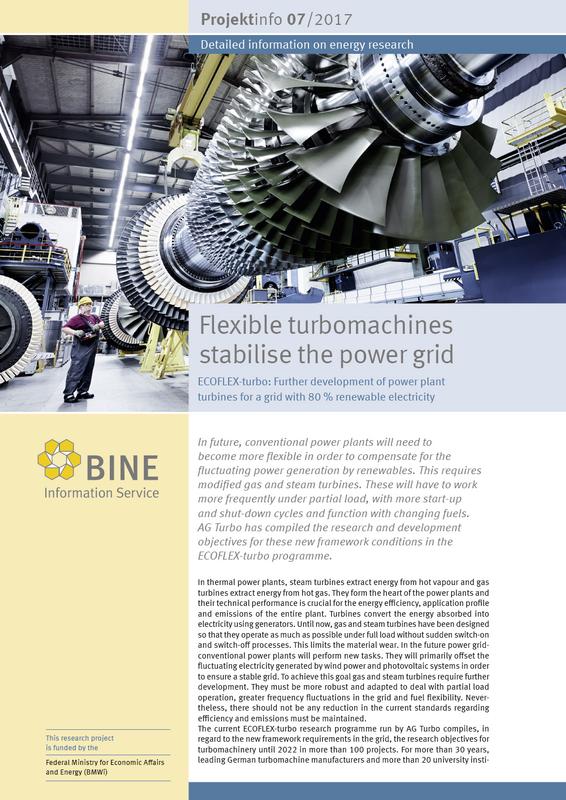
Flexible Turbomachines: Adapting to Renewable Energy Fluctuations

The BINE-Projektinfo brochure entitled “Flexible turbomachines stabilise the power grid”
© BINE Informationsdienst
Compensating for the fluctuating electricity generated by renewable energies
The research and development targets within this programme, which represents the combined turbine research in Germany under the auspices of the AG Turbo alliance, are aimed at increasing the partial load operation, faster response times, varying fuels and the utilisation of more hydrogen.
Until now, turbines have been designed to run as smoothly as possible under full load conditions in order to achieve good values in terms of efficiency, emissions and longevity. However, increasing the partial load operation now represents a new challenge for turbine technology.
Turbines with greater flexibility will require, for example, more robust compressors and combustion chambers as well as new computer software in order to design components and analyse test results. This data will form the basis for powerful simulation models and help to shorten development times in future.
A further aim is to design turbines not only for fuel gas with a higher hydrogen content but, if possible, turbines that only utilise hydrogen. Such a power unit would provide a key component for power-to-X concepts.
AG Turbo is an alliance of leading German turbine manufacturers and more than 20 scientific institutions that account for more than two thirds of the subsidised projects in turbine research. Approximately 30% of the globally traded turbomachines come from manufacturers in Germany.
You found all informations about the BINE Projectinfo brochure entitled “Flexible turbomachines stabilise the power grid” here:
http://www.bine.info/en/press/press-releases/press/pressemitteilung/flexiblere-t…
Uwe Milles/Birgit Schneider
presse(at)bine.info
About BINE Information Service
Energy research for practical applications
The BINE Information Service reports on energy research topics, such as new materials, systems and components, as well as innovative concepts and methods. The knowledge gained is incorporated into the implementation of new technologies in practice, because first-rate information provides a basis for pioneering decisions, whether in the planning of energy-optimised buildings, increasing the efficiency of industrial processes, or integrating renewable energy sources into existing systems.
About FIZ Karlsruhe
FIZ Karlsruhe – Leibniz Institute for Information Infrastructure is a not-for-profit organization with the public mission to make sci-tech information from all over the world publicly available and to provide related services in order to support the national and international transfer of knowledge and the promotion of innovation.
Our business areas:
• STN International – the world’s leading online service for research and patent information in science and technology
• KnowEsis – innovative eScience solutions to support the process of research in all its stages, and throughout all scientific disciplines
• Databases and Information Services – Databases and science portals in mathematics, computer science, crystallography, chemistry, and energy technology
FIZ Karlsruhe is a member of the Leibniz Association (WGL) which consists of 87 German research and infrastructure institutions.
http://www.bine.info/en – BINE Informationsdienst












